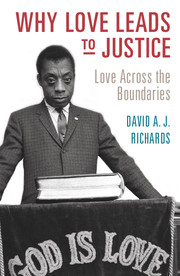Book contents
- Frontmatter
- Dedication
- Epigraph
- Content
- Acknowledgments
- Introduction: Love Resists Injustice
- 1 Breaking the Love Laws as Resistance
- 2 Benjamin Britten and Peter Pears: Love and Resistance
- 3 Christopher Isherwood's Struggle for a Resistant Voice
- 4 Wystan Auden on the Anxiety of Manhood
- 5 Bayard Rustin on Nonviolence
- 6 James Baldwin on Love and Voice
- 7 Eleanor Roosevelt, Margaret Mead, and Ruth Benedict on Resisting Patriarchy
- Conclusion: Moral Injury and Love: Why Love Leads to Justice
- Bibliography
- Index
1 - Breaking the Love Laws as Resistance
Published online by Cambridge University Press: 05 November 2015
- Frontmatter
- Dedication
- Epigraph
- Content
- Acknowledgments
- Introduction: Love Resists Injustice
- 1 Breaking the Love Laws as Resistance
- 2 Benjamin Britten and Peter Pears: Love and Resistance
- 3 Christopher Isherwood's Struggle for a Resistant Voice
- 4 Wystan Auden on the Anxiety of Manhood
- 5 Bayard Rustin on Nonviolence
- 6 James Baldwin on Love and Voice
- 7 Eleanor Roosevelt, Margaret Mead, and Ruth Benedict on Resisting Patriarchy
- Conclusion: Moral Injury and Love: Why Love Leads to Justice
- Bibliography
- Index
Summary
How and why does love matter to justice, or, more precisely, the struggle for justice?
To answer this question, we need to understand patriarchy, both its psychology, and its tension with, indeed contradiction to, democratic values in both our public and private lives. Patriarchy – both its structure and psychology – supports and indeed enforces the antidemocratic structural injustices of extreme religious intolerance, racism, sexism, and homophobia. One of the ways it has done so is through its enforcement of the patriarchal Love Laws, an idea central to Arundhati Roy's brilliant novel, The God of Small Things. Roy's novel is one of many examples in my collaborative work with Carol Gilligan (Hawthorne's The Scarlet Letter is another) in which we have found that great artists illuminate the psychology of patriarchy, its roots in trauma, loss of voice, and disassociation, and the tension between love and patriarchy. It is only when we take seriously both patriarchy and its psychology, as well as the role of the Love Laws in their unjust demands, that we can begin to understand how and why sometimes love across boundaries enforced by the Love Laws plays the role it does in resisting injustice. Therefore, I first explore patriarchy and the Love Laws, and then investigate the creative role breaking the Love Laws can and has played in resisting injustice. My examples in this chapter are all heterosexual, showing, from the very beginning of my argument, that my analysis addresses a real issue for all sexual orientations. I begin with Hawthorne's astonishing novel, and then turn to the remarkably creative voices resisting patriarchy that arose from the relationships of several Victorian adulterous couples – Henry Lewes and George Eliot (Marian Evans), and Harriet Taylor and John Stuart Mill.
Patriarchy “is an anthropological term denoting families or societies ruled by fathers. It sets up a hierarchy – a rule of priests – in which the priest, the hieros, is a father, pater. As an order of living, it elevates some men over other men and all men over women; within the family, it separates fathers from sons (the men from the boys) and places both women and children under a father's authority.” So, in patriarchy, the father – pater – fulfills the function of the priest, occupying the top of authority in its various dimensions (family, religion, politics, and the like).
- Type
- Chapter
- Information
- Why Love Leads to JusticeLove across the Boundaries, pp. 12 - 30Publisher: Cambridge University PressPrint publication year: 2015



